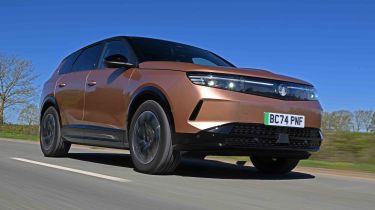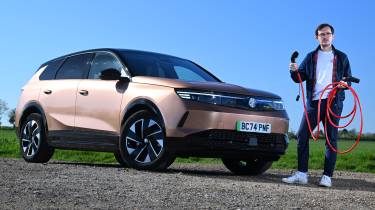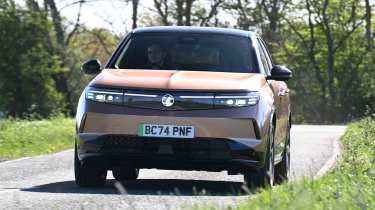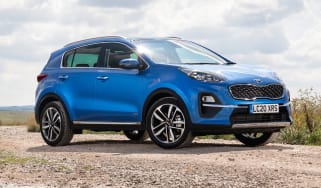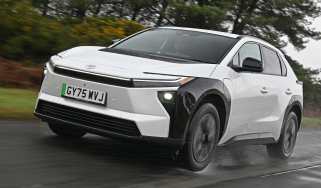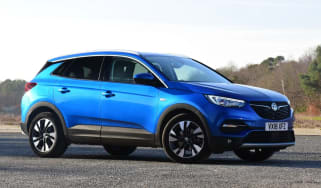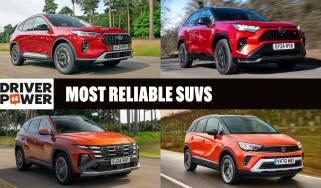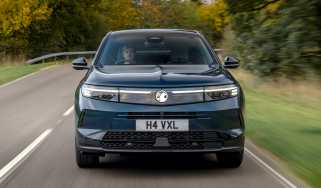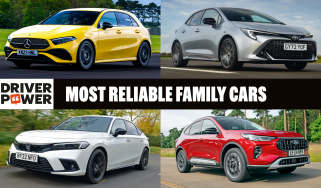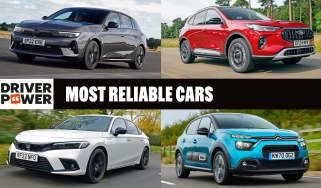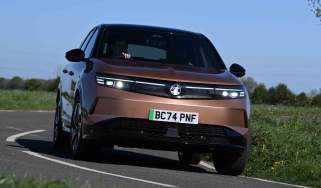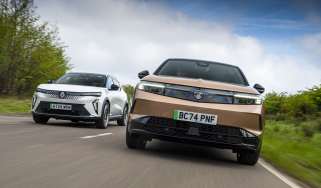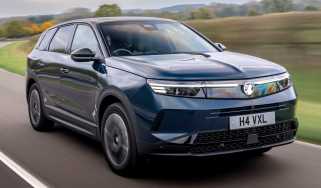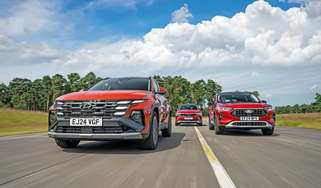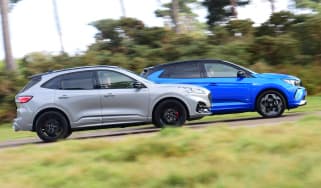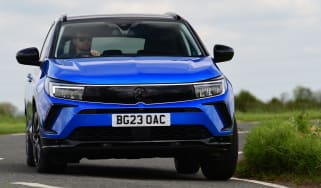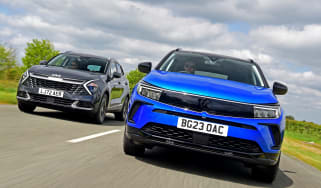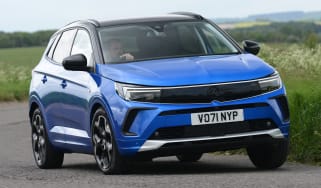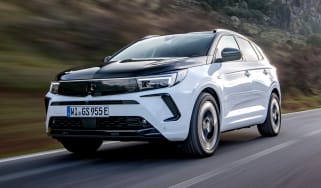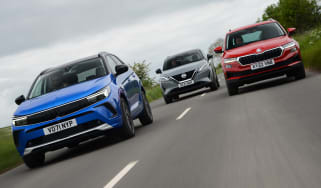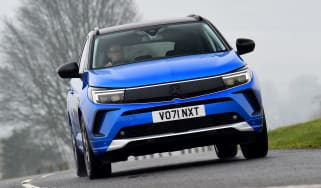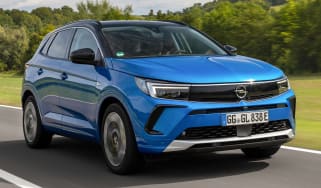Vauxhall Grandland review
The Vauxhall Grandland is a practical and attractively priced family SUV, but it’s not particularly interesting to drive

Our opinion on the Vauxhall Grandland
The latest Vauxhall Grandland is a vast improvement over the original. There are some impressive family-friendly touches to accompany class-leading practicality, although we’ve seen better quality interiors. Equipment levels are decent (especially on our preferred mid-spec GS trim), and the latest Grandland has a much classier look.
It’s far from the best to drive in this segment, especially in mild-hybrid form, with an unnecessarily firm ride and vague steering holding it back. The EV is our preferred choice from behind the wheel, and with well over 400 miles of range for the incoming 98kWh battery model, the Grandland Electric looks like a particularly strong choice.
About the Vauxhall Grandland
The latest Vauxhall Grandland is available in both all-electric and mild-hybrid forms, drawing its technical basis from Stellantis’ STLA Medium platform that you’ll also find used for the Peugeot E-3008. The two share an awful lot under the skin, but even when you look really hard, there’s little on the surface to suggest that is the case.
The Grandland range comprises Design, GS and Ultimate trim levels for both the mild-hybrid and all-electric models. Powering the mild-hybrid Grandland is a 1.2-litre, three-cylinder petrol unit mated to a 48V hybrid system and a 28bhp electric motor, for a total of 143bhp. A six-speed dual-clutch transmission is standard.
Used - available now

2024 Vauxhall
Grandland
22,610 milesManualPetrol1.2L
Cash £15,750
2024 Vauxhall
Grandland
23,720 milesManualPetrol1.2L
Cash £15,665
2024 Vauxhall
Grandland
4,013 milesAutomaticPetrol1.2L
Cash £19,025
2024 Vauxhall
Grandland
12,943 milesAutomaticPetrol1.2L
Cash £25,900The Grandland Electric comes with a 73kWh battery and 210bhp electric motor for a range of up to 323 miles. A larger capacity battery is due to arrive shortly, with a 97kWh capacity, allowing for a range of 435 miles. Additionally, a 320bhp dual-motor four-wheel drive Grandland Electric is available, featuring a 0-62mph time of 6.1 seconds and a 311-mile driving range.
So far, we’ve tested the Grandland hybrid and Grandland Electric extensively on UK roads, even running the Grandland Electric in 73kWh GS trim as part of a long-term test. We've also twin-tested the Grandland Electric against the Renault Scenic, with the Scenic coming out on top over the Grandland thanks to an easy to use infotainment system, a more powerful electric motor, and a larger capacity battery that affords it better driving range.
Vauxhall Grandland prices and latest deals
The Vauxhall brand is among a growing number of manufacturers that qualify for the Government's Electric Car Grant (ECG) announced in July 2025. The Grandland Electric is one of the Vauxhall models eligible for the £1,500 grant that is applied automatically when you buy.
If you're interested in getting yourself a Vauxhall Grandland Electric, we can help. Configure your ideal Vauxhall Grandland Electric now to get top offers from local dealers, check out the latest Vauxhall Grandland Electric leasing deals, or search for used Vauxhall Grandland Electric models with our Buy A Car service. You can even sell your existing car for a great price with Auto Express Sell My Car.
Performance & driving experience
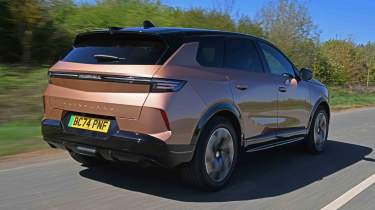
Pros |
|
Cons |
|
The first thing you notice when setting off in the mild-hybrid Vauxhall Grandland is the lack of engine noise (if you have the Eco mode selected). There’s impressive flexibility to the electric motor, which can work up to 84mph and cover 50 per cent of town and city driving according to Vauxhall.
Compared to the MHEV, the Grandland Electric felt much more compliant over bumps and ruts in the road. We put this down to the extra weight (a whopping 532kg more than the hybrid), a multi-link rear suspension set-up, plus it also gets Vauxhall’s frequency-selective damping technology, which adds another valve in the damper to provide different characteristics depending on road conditions and driving style. The latter two features aren’t included on the hybrid due to cost. You'll also have to go electric if you need the additional traction of four-wheel drive in slippery conditions, because you can't get a four-wheel drive Grandland in mild- or plug-in hybrid forms.
Performance, 0-60mph acceleration and top speed
The mild-hybrid 1.2-litre three-cylinder petrol unit is pretty familiar now, having been used across a variety of Stellantis products. With 143bhp, it has enough for a car the size of the Grandland and the electrical assistance from the hybrid system is fairly smooth. This engine isn’t the most cultured unit, though the lack of refinement is somewhat dialled down by the smooth, yet sluggish, automatic gearbox. The Grandland mild-hybrid accelerates from zero to 62mph in 10.2 seconds and has a top speed of 126mph.
The Grandland Electric, with a healthier 206bhp, manages the same sprint in nine seconds flat. It has a lower top speed than the mild hybrid version at 106mph, but even if you could do that speed legally, you wouldn’t want to for very long because that will use lots of energy and compromise how far you can travel on a charge.
We haven't yet tried the slightly more powerful 227bhp 98kWh model, but its additional weight due to the larger capacity battery means it's no quicker than the 73kWh version in the dash from 0-62mph. For something that can get away from the line with more authority, you'll need the Grandland AWD. We're also yet to try this version, but it's promised to shorten the 0-62mph sprint to 6.1 seconds.
| Model | Power | 0-60mph | Top speed |
| 1.2 Hybrid Design | 143bhp | 10.2s | 126mph |
| Electric 73kWh Design | 208bhp | 9.0s | 106mph |
| Electric 73kWh AWD GS | 320bhp | 6.1s | 112mph |
Town driving, visibility and parking
Around town, the Grandland is a breeze to drive thanks to great visibility. An elevated seating position and proper rear three-quarter windows help here, as do the various safety systems, which worked perfectly for us. It’s a shame the mild-hybrid doesn’t have the same low-speed ride quality as the EV.
While front and rear parking sensors are fitted to all models, we’d recommend going for the mid-range GS in order to get a reversing camera that helps when parking in tight spaces. If you want a 360-degree camera system, then you’ll need to go for the top-of-the-range Ultimate trim.
The steering has a good weight to it, although it’s not overly keen to self-centre, so you’ll be turning the wheel a little more often than expected around town.
B-road driving and handling
The Grandland isn’t the kind of car you’d take on a spirited drive. The mild-hybrid powertrain doesn’t feel especially punchy, and a slow gearbox dulls the experience. The steering, while nicely weighted, doesn’t give you much feedback from the front wheels. Overall grip is pretty decent, and the Grandland corners in a safe, stable manner.
Motorway driving and long-distance comfort
The Grandland is pretty refined on the motorway in terms of wind and road noise. The EV version is comfortable on long trips, but the mild-hybrid feels unsettled in comparison.
All Grandland models come with adaptive cruise control to keep you a safe, preset distance from the car in front, and it features intelligent speed adaptation to adjust your speed if it recognises that the limit has changed.
“It’s frustrating that in the mild-hybrid Grandland, the dash display doesn’t give a lot of information about when the electric motor has kicked in, and there’s no EV button, so the self-satisfied feeling of running with the petrol engine off at low speed is diminished.” – Paul Barker, Auto Express Editor
MPG & running costs
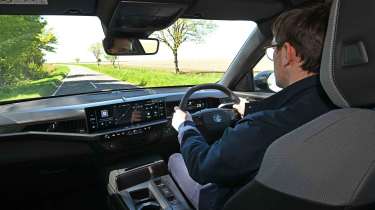
Pros |
|
Cons |
|
The Vauxhall Grandland comes with a relatively low drag coefficient of 0.28, which not only helps the all-electric model, but also the economy of the mild-hybrid, too. Many of the Grandland’s MHEV rivals will fail to crack 50mpg on a combined cycle, so a claimed 51.4mpg combined efficiency is impressive.
Vauxhall says that 50 per cent of urban driving can be done on electric power only, and we found that the electric motor is happy to provide a surprising amount of the Grandland’s power at low speeds, despite having only 28bhp. The motor can be used at up to 84mph, too.
CO2 emissions of 125g/km for the mild-hybrid Grandland are pretty impressive, beating rivals like the Ford Kuga Full Hybrid (132g/km), Toyota RAV4 (130g/km) and the mild-hybrid Hyundai Tucson (142g/km).
Company car drivers who can’t quite make an EV work but want lower Benefit-in-Kind (BiK) costs than the mild-hybrid model will be pleased to know a plug-in model will join the range down the line. It’ll combine the same 1.2-litre three-cylinder engine with a more powerful e-motor and a higher capacity battery pack that should be able to drive for up to 50 miles on electric power alone. Efficiency figures have yet to be revealed for the PHEV, but expect them to be high, based on heavy utilisation of the electric-only mode.
| Model | MPG | CO2 | Insurance group |
| 1.2 Hybrid Design | 51.4mpg | 125g/km | 23 |
Electric range, battery life and charge time
The Grandland Electric is offered with a 73kWh battery with a maximum range of 323 miles in Design trim. There's also a high-performance four-wheel drive version with the same capacity battery with 306 miles of range, along with a larger 98kWh capacity battery version with up to 435 miles of range. For comparison, the Peugeot E-3008 is available with similar battery and electric motor configurations, and has a range of between 303 miles and 435 miles, depending upon the configuration.
Our long term test of a Vauxhall Grandland Electric GS yielded an average efficiency of 3.6 miles/kWh, or 263 miles of range based on its 73kWh battery capacity.
As part of the warranty agreement, the Grandland Electric’s battery is protected for up to eight years and 100,000 miles. Vauxhall will also guarantee the battery will hold up to 70 per cent of its charge during this period.
The Grandland Electric's charging speeds are fairly competitive for the large EV segment. The 73kWh battery model provides 160kW charging, taking around 30 minutes to charge from 10 to 80 per cent. We don't have a charging time for the 98kWh model, but it also has 160kW charging so expect it to take a little longer than the small battery version.
While the Grandland Electric is capable of accepting up to 11kW charging from an AC power source, many will have a slower 7.4kWh wallbox charger at home, and that’ll take around 12 hours to fully recharge the 73kWh version. Figures for the 98kWh aren't available yet, but for the mechanically similar Peugeot E-3008 with the same battery, it's likely to take around 15.5 hours to be recharged from 0 to 100 per cent.
Brake regeneration comes as standard and features three levels of recuperation. We found each level to provide a distinct difference in terms of strength, although one-pedal driving isn’t quite possible. An energy-efficient heat pump is provided as standard, and helps to preserve the driving range by consuming less electricity to warm the interior in colder weather.
| Model | Battery size | Range | Insurance group |
| Electric Design 73kWh | 73kWh | 323 miles | 34 |
| Electric Design Long Range | 98kWh | 435 miles | 36 |
Insurance groups
The latest Vauxhall Grandland starts in insurance group 23 for the 1.2 Hybrid Design. That’s on par with other hybrid family SUVs like the 2.5 FHEV version of the Ford Kuga, but falls short of the regular petrol Ford Kuga, which starts in group 16.
The electric Grandland starts in group 34, which is two insurance groups higher than its Peugeot E-3008 sibling.
Tax
The Grandland Hybrid falls into the 31 per cent Benefit-in-Kind (BiK) tax band thanks to its emissions of 125g/km, while the all-electric model attracts a three per cent BiK rate (rising to four per cent for the ‘26 to ’27 tax year, and five per cent from ‘27 to ‘28).
All Grandland hybrid models come in below the £40,000 mark, and avoid the supplementary luxury car tax fee for expensive cars – although you might want to be careful which options you pick on the top-of-the-range Ultimate trim, because you can spec your Grandland beyond that limit and incur a surcharge from the second time the vehicle is taxed until it is six years old.
The Grandland Electric being an EV comes under the revised £50,000 limit, and thanks to affordable pricing, is comfortably below this threshold – even in its most expensive form.
EV owners might want to consider the proposed eVED pay-per-mile fee, which may come into force from April 2028 onwards.
Depreciation
The current generation Grandland hybrid is predicted to hang on to around 50 per cent of its original value after three years or 36,000 miles, which is on par with the Ford Kuga. It can't quite match the Hyundai Tucson, though, which is predicted to retain between 53 to 56 per cent of its value.
The Grandland Electric fares better, retaining between 53 to 58 per cent over the same period, performing a lot better than its sibling, the Peugeot E-3008, which is only predicted to retain around 38 to 40 per cent per cent of its value, while the Renault Scenic is expected to still be worth 56 per cent of its original value over the same period.
To get an accurate valuation on a specific model check out our free car valuation tool...
Interior, design & technology
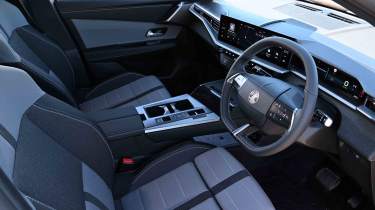
| Pros |
|
| Cons |
|
The second-generation Grandland features the latest form of Vauxhall’s Visor styling, which is also seen on the smaller Vauxhall Mokka and Vauxhall Frontera SUVs. Oddly, Carbon Black metallic is the non-cost option, while the solid paint colours (Arctic White and Graphic Grey) cost the same £650 as the remaining metallic choices: Spectrum Blue, Crystal Grey, and Impact Copper. The latter hue, in our opinion, stands out the best.
The entry-level Design specification has Vauxhall’s ‘PureSense’ safety systems as standard, including adaptive cruise control, lane keep assist, and front and rear parking sensors. You’ll find twin 10-inch displays inside with wireless Apple CarPlay and Android Auto compatibility, and 19-inch alloy wheels on the outside.
Our preferred GS trim gains some worthwhile extras that set it apart from other models in the range, including:
- Larger 16 inch infotainment screen with sat-nav
- Wireless phone charger
- Heated steering wheel
Above this is the Ultimate, which adds Vauxhall’s latest ‘Intelli-drive 2.0’ safety equipment with lane change assist, rear cross traffic alert, semi-autonomous lane change, curve speed adaptation and a 360-degree panoramic camera. There’s also an uprated sound system, head-up display and a powered bootlid.
Interior and dashboard design
Jump inside the Grandland and you’re met with two rather thin screens. The driver’s display measures 10 inches and butts up to the central touchscreen (10 inches in Design trim and 16 inches in mid range GS and above). They don’t take up a lot of the dash and don’t feel too distracting, either. The driver’s display has all the necessary information you’d expect, and it’s clearly visible, unlike the i-cockpit layout in the Peuegot 3008.
We found some parts of the interior to be lacking in quality compared with rivals. Vauxhall says the new Grandland goes “upwards in quality and positioning”, but while it’s certainly an improvement on the previous car, there are some noticeable scratchy black plastics and gaps in the trim.
Materials and build quality
There are a lot of different materials on show in the Grandland’s cabin, although some people might find it a little fussy. The good news, though, is that Vauxhall says 85 per cent of them are recyclable. However, even with the ambient lighting function offered on GS trim and above, it’s a little dreary and certainly lacks the flair of the Peugeot 3008’s cabin. Common touchpoints, such as the doors, steering wheel rim, and centre console, generally feel premium enough for the segment, however. We’re just not all that convinced by the touch-sensitive controls on the steering wheel, which lack the tactility of proper buttons and both look and feel cheap.
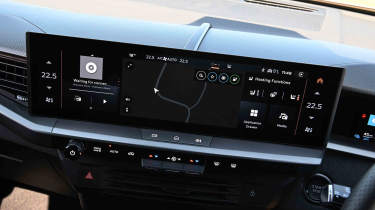
Infotainment, sat-nav and stereo
We like the central infotainment screen, which is angled towards the driver for a more driver-focused environment, although not to the same extent as in the Peugeot 3008. A 10-inch touchscreen comes as standard on Design trim and includes wireless Apple CarPlay and Android Auto. Our preferred GS trim and the top-of-the-range Ultimate feature a larger 16-inch unit with sat-nav. We found smartphone pairing to be pretty seamless, and the screen sufficiently responsive.
The climate controls that are constantly visible on the sides of the screen are a helpful touch, and they are complemented by a row of physical tabs beneath, comprising climate, volume and demisting controls. Vauxhall said this was a direct result of customer feedback.
Up front, there’s a single USB-C port on entry-level Design models, with GS adding two more for the rear passengers, plus wireless smartphone charging. The top-of-the-range Ultimate trim gets an upgraded 10-speaker Focal sound system, similar to what can be found in its sibling, the Peugeot 3008.
“Ultimate trim comes with a head-up display that projects important information like speed onto the windscreen. Like the Astra, the position of the projection can be easily adjusted using the door mirror adjuster, which is a really well thought-out feature, and far better than BMW, which buries said controls deep within its infotainment system” - Max Adams, Online reviews editor
Boot space & practicality
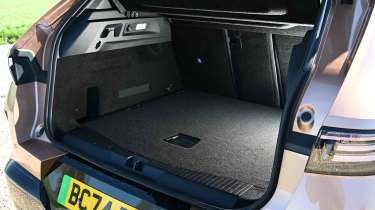
| Pros |
|
| Cons |
|
The Vauxhall Grandland is one of the most spacious cars in its class. It doesn’t feel like a dauntingly big car on the road, however, thanks to a lofty driving position providing a decent view of its extremities.
Although it’s Vauxhall’s flagship model, there’s no seven-seater version of the Grandland available. If you need the extra capacity, you’ll have to wait for the seven-seat Vauxhall Frontera to arrive, or look at the van-based Vauxhall Vivaro Life eight-seater.
Along with 35 litres of cabin storage, Vauxhall has added a quirky new feature to the Grandland in the new ‘pixel box’, offered on the mid-level GS and range-topping Ultimate. This is where the wireless charging pad can be found, and it comes with a semi-transparent front section so you can see if your phone is charging, with a sliding lid to cover it. When you exit the Grandland a light illuminates the pixel box to remind you it’s there. We didn’t find it all that helpful during our time with the car, but you might find it more useful after living with the car.
Dimensions and size
The Grandland is one of the larger cars in the mid-size SUV segment. It’s 140mm longer than a Hyundai Tucson and 11mm taller, plus larger in every dimension than its Peugeot 3008 sibling and the Volkswagen Tiguan. It’s not quite the same size as seven-seat SUVs such as the Peugeot 5008, Kia Sorento and Skoda Kodiaq, however.
| Dimensions comparison | |||
| Model | Vauxhall Grandland | Peugeot 3008 | Renault Scenic |
| Length | 4,650mm | 4,542mm | 4,470mm |
| Width | 1,905mm (2,108mm inc mirrors) | 1,895mm (2,108mm inc mirrors) | 1,864mm (2,085mm inc mirrors) |
| Height | 1,661mm | 1,641mm | 1,572mm |
| Wheelbase | 2,794mm | 2,739mm | 2,785mm |
| Boot space | 550-1,645 litres | 588-1,663 litres | 545-1,670 litres |
Seats & passenger space
Vauxhall claims it has improved the Grandland’s comfort on long journeys compared to the old model, and it’s certainly a step in the right direction. We’d recommend that you go for the mid-range GS trim because both front seats come with adjustable lumbar support, which should further improve comfort over long journeys.
Interior space upfront is generally very good, with plenty of headroom and legroom for front occupants, who also get under-thigh support extensions. Despite the wide centre console, it doesn’t feel cramped, thanks in part to a large glasshouse and a windscreen set far back from the dash.
Rear occupants won’t be complaining about headroom or kneeroom (our 5ft 11in tall tester still had plenty of spare room), but because there’s a high floor due to the way the batteries are mounted underneath the car, there isn’t a great deal of space for those in the back to slide their feet under the front seats. That’s a surprise given the wheelbase is now 2,784mm – some 109mm more than the old car.
Another effect caused by the positioning of a battery under the floor is that you have to climb up a little bit to get into the Grandland.

Boot space
Unlike many of its rivals, the Grandland has the same boot capacity on the mild-hybrid and all-electric models. A total of 550 litres marks an increase of 36 litres over the old car and 30 litres more than the Peugeot E-3008. There’s a 40:20:40 split rear bench, too, which can be folded to create 1,645 litres, which is just three litres more than the previous Grandland offered.
The opening of the boot is a little high, but that’s to be expected given the growth in dimensions over the old Grandland. There’s no lip to the boot, which is good for loading hefty items, and the aperture is impressively wide, too. A couple of baggage hooks and elasticated holders are helpful, and Vauxhall also specifically states the Grandland was designed to carry a washing machine in the boot, thanks to its 1.03-metre width.
“Out of the entire Vauxhall Grandland range, it’s the electric version that has the most towing capacity. However, a 1,350kg capacity for the four-wheel drive version isn’t a huge amount, especially when the Ford Kuga can pull up to 2,100kg in either plug-in hybrid, or four-wheel drive hybrid forms, while the all-electric Kia EV6 can handle up to 1,800kg” – Max Adams, Online reviews editor
Reliability & safety
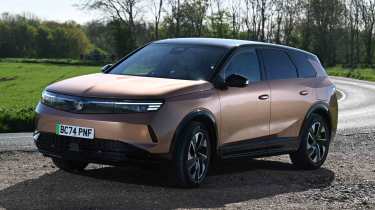
| Pros |
|
| Cons |
|
As standard, the Vauxhall Grandland gets a suite of passive and active safety features. Adaptive cruise control, lane keep assist and traffic sign recognition are included on the entry-level Design models. But if you want Vauxhall’s Drive Assist 2.0 system with rear cross traffic alert, blind spot monitoring, lane change assist and a 360-degree rear parking camera, you’ll have to go for the range-topping Ultimate trim, because it isn’t available separately as an option on Design or GS trims.
The Vauxhall Grandland gained a slightly disappointing four stars out of five result from Euro NCAP (the same as its Peugeot 3008 and Peugeot 5008 siblings) when the car was tested in 2025. Rivals like the Ford Explorer and Volkswagen Tiguan both gained the maximum five star rating.
Both the STLA Medium platform and Grandland are too new to have been included in the latest Driver Power customer satisfaction survey. But build quality seemed pretty good to us in both the Vauxhall and its Peugeot E-3008 cousin. The Vauxhall brand and its dealers seem to be doing the right thing by their customers, because it finished fourth out of 31 brands in our 2025 Driver Power manufacturer's survey, ahead of Renault (6th), Skoda (12th), Kia (18th), Hyundai (20th), and VW (27th).
| Euro NCAP safety ratings | |
| Euro NCAP safety rating | Four stars (2025) |
| Adult occupant protection | 82% |
| Child occupant protection | 85% |
| Vulnerable road user protection | 79% |
| Safety assist | 62% |
Buying and owning
Our best buy: Vauxhall Grandland Electric GS
We recommend stepping up to the GS trim above the entry-level Design, because it offers a range of useful equipment without a significant price increase. Besides niceties such as a heated steering wheel, privacy glass, a wireless phone charger, and sat-nav. The price difference between the mild-hybrid petrol and electric versions in this trim is small, and besides offering quieter driving and greater performance, our preferred electric Grandland could potentially save you a lot of money on your running costs, especially if you utilise a cheaper overnight electricity tariff charging at home.
Like its mild-hybrid petrol sibling, the electric Grandland has long 24-month, 16,000-mile service intervals. However, it will cost less to service the EV version, with a fixed price policy of just under £13 per month for the electric model, and around £20 per month for the petrol. The 1.2-litre mild-hybrid model uses a timing chain that doesn’t have regular replacement intervals, which is a step on from the timing belt used in the 1.2-litre non-hybrid petrol fitted to the previous generation Grandland, which would need periodic inspection and would eventually need to be replaced at great expense.
All versions of Grandland come with a three-year/60,000-mile warranty (whichever comes first), while the electric version gets an eight-year/100,000-mile policy for the battery pack, guaranteeing that it remains above 70 per cent capacity over that time and mileage period.
Vauxhall Grandland alternatives
The mid-sized family SUV market is heavily congested, and the previous Grandland not only had combustion-engined cars to worry about, but a few EVs too. The latest Grandland also fights on both of those fronts, thanks to its STLA Medium platform, which accommodates mild-hybrid (MHEV) and battery electric vehicle (BEV) power. Key rivals include the Hyundai Tucson, Kia Sportage, Ford Kuga, Nissan Qashqai and Volkswagen Tiguan. The Grandland Electric, meanwhile, takes on its Stellantis stablemate, the Peugeot 3008, as well as the Kia EV6, Hyundai Ioniq 5, Nissan Ariya, Ford Explorer and Volkswagen ID.4.
Key updates of the Vauxhall Grandland review
2 February 2026: Updated to reflect the increased expensive car supplement threshold and mention the proposed pay-per-mile tax for EVs from 2028.
Deals on the Vauxhall Grandland and alternatives
Vauxhall Grandland Electric GS long-term test
Consumer reporter, Tom Jervis, is currently running a Vauxhall Grandland Electric GS as part of an Auto Express long-term test. So far, it's proven to be a refined motorway companion, while the cooled centre console has kept all manner of things cold on longer trips, from bottles of water to a tub of ice cream.
There have been some niggles, such as the touchscreen getting rather hot, and a chirping noise from the air-conditioning system behind the dashboard. You can read the full long-term test here…
Vauxhall Grandland pictures
Frequently Asked Questions
The Vauxhall Grandland comes with a three-year/60,000-mile warranty, with the battery in the Grandland Electric covered for eight years/100,000 miles.
